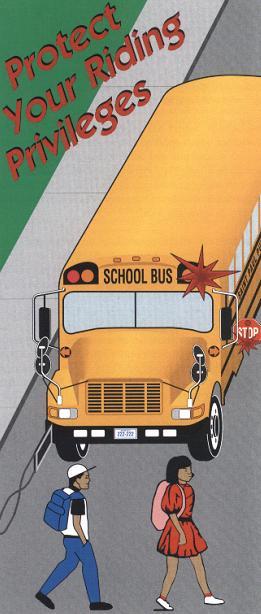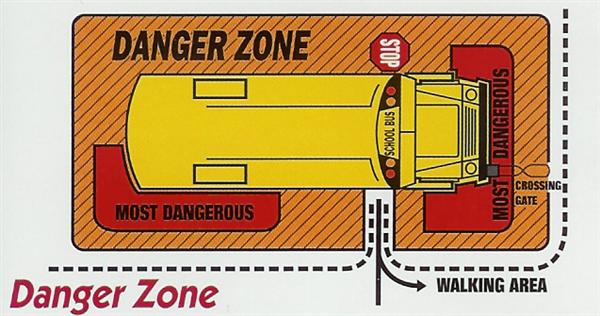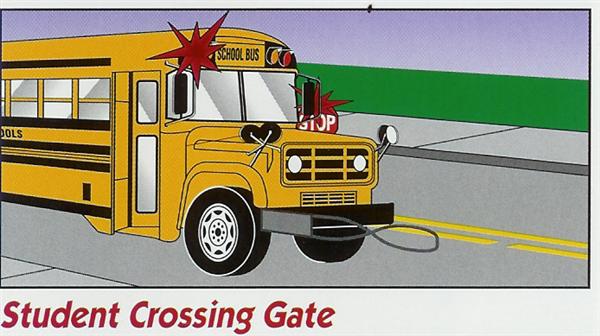Transportation
-
Transportation: A Privilege Not A Right
 Each transported student has the right to a safe and enjoyable ride to and from school which is free from intimidation threat or harassment. Good conduct of all transported students while waiting for the school bus and while traveling to and from school is primary to a safe and enjoyable ride for all students.
Each transported student has the right to a safe and enjoyable ride to and from school which is free from intimidation threat or harassment. Good conduct of all transported students while waiting for the school bus and while traveling to and from school is primary to a safe and enjoyable ride for all students.The school district has established student behavior guidelines which apply to all transported students while on the school bus and while in school bus loading or unloading areas. Each individual student as well as his / her parents or guardians is responsible for the behavior of that student while on the school bus and in school bus loading or unloading areas.
Transportation service is a privilege that is granted to the student contingent upon the exhibition of proper behavior according to district behavioral guidelines. Minnesota statute 121A.59 provides that transportation is a privilege not a right for an eligible student. A student's eligibility to ride the school bus may be suspended or revoked for a violation of school bus safety or conduct policies or for a violation of any other law or policy governing student conduct on a school bus. Revocation of a student's bus riding privileges is not an exclusion expulsion or suspension under the Fair Pupil Dismissal Act of 1974.
Parents of transported students are responsible for supervising their children until such times as the student boards the school bus in the morning and after the child leaves the bus at the end of the school day. Parents also share responsibility with the child for his/her conduct while on the school bus and while in school bus loading or unloading areas.
Students who are involved in serious or repeated incidents of unacceptable student conduct on the school bus will have their riding privileges suspended or revoked. The parent / guardian of a student suspended from transportation is responsible for ensuring that the student travels safely to and from school. The District will not provide alternative transportation to a student whose transportation privileges have been suspended or revoked.
Danger ZoneStudents who must cross the street must wait for the signal from the bus driver and must walk 10 feet out from the bumper of the school bus. This places them outside the danger zone surrounding the school bus. Students must always remain where the driver can see them.
Student Crossing Gate
All Saint Paul school buses are equipped with a student crossing gate. This is a device which extends from the bumper of the bus when the entrance door is opened when making student pickups and dropoffs.
Unacceptable Behavior
CLASS I OFFENSES (MOST SERIOUS)
- Possession of a handgun, knife, or other weapon.
- Detonation of ammunition.
- Detonation of a pyrotechnic device on the school bus.
- Sale or distribution of alcohol or drugs.
- Assault against the school bus driver.
- Attempting to ride on the outside of the school bus.
- Bringing a flammable liquid onto the school bus.
- Igniting, or attempting to ignite, any object.
- Pushing or shoving another at, or near, a moving school bus.
- Running out in front of a moving school bus.
- Violent assault on another student.
- Tampering with, or vandalism of, the school bus crossing gate.
- Opening any emergency exit, or exiting, or attempting to exit, from a moving school bus.
- Extending head out of window while bus is in motion.
- Other extremely dangerous and/or illegal actions
Class II OFFENSES (SERIOUS)
- Threatened assault upon the school bus driver.
- Interfering with a police officer, district administrator, or safety supervisor.
- Use of tobacco.
- Ignition of any type of fire, including matches and lighters.
- Physical aggression, or the threat of physical aggression, against another person.
- Fighting.
- Theft or robbery.
- Possession of a pyrotechnic device.
- Possession of a look-a-like weapon.
- Tampering with emergency equipment including 8 light system, radio, and emergency exits.
- Extending arms or legs out the window while the bus is in motion.
- Chasing, or running beside, a moving school bus.
- Throwing or shooting an object, or objects, at the bus driver or out of the bus window.
- Distracting the school bus driver.
- Bringing dangerous objects onto the school bus (other than weapons or flammable liquids).
- Riding while under suspension of transportation privileges.
- Pushing or shoving another student in the school bus danger zone.
- Willful damage to property at the school bus stop.
- Willful damage to the property of other students.
- Unacceptable sexual conduct.
- False identification or refusal to provide the driver with the student’s name.
- Failure to follow safe crossing procedures.
- Possession of ammunition.
- Possession of alcohol or unprescribed drugs.
CLASS Ill OFFENSES
- Vandalism of the school bus.
- Throwing or shooting objects around the school bus.
- Failure to follow the driver’s instructions.
- Standing while the school bus is in motion.
- Pushing, shoving, or hitting another student.
- Failure to cross the street ten feet in front of the school bus.
- Use of obscene or profane gestures or language.
- Harassment in any form.
- Riding on a bus other than the assigned route.
- Boarding or exiting other than at the assigned stop.
- Eating or drinking on the school bus.
- Shouting, yelling, screaming, or excessive noise.
- Tripping a student.
- Blocking the school bus aisle.
- Spitting.
- Horseplay.
- Possession of a lighter or matches.
- Possession of squirt guns, water balloons, liquid containers of any type, shaving cream, or eggs.
- Possession of cap guns, or other obvious toy weapons.
If a student commits offenses of different classes during the same incident, the consequences associated with the more serious class of offense must be applied.
Consequences For Unacceptable BehaviorIncidents of unacceptable student conduct on or near a school bus, or at the school bus stop, are divided into Class I, II, Ill offenses, depending on the severity of the incident. The consequences to be applied are:
CLASS I OFFENSES (Most Serious Offenses)
First Offense: Grades 4-12 and Second Offense Grades K-3:
Loss of bus service for the remainder of the school year or 120 days whichever is longer.
First Offense: Grades K-3 Loss of bus service for 30 days and parent conference.CLASS II OFFENSES (Serious)
First Offense: Written warning and 1-5 day suspension of transportation privileges and written notification of parent/guardian.
Second Offense: 3-5 day suspension of transportation privileges and parent conference.
Third Offense: 10 day suspension of transportation privileges and parent conference.
Fourth Offense: 30 day suspension of transportation privileges and parent conference.
Fifth Offense: Loss of transportation privileges for the remainder of the school year or 120 days, whichever is longer.
CLASS III OFFENSESFirst Offense: Conference with principal and written notification of parent/guardian.
Second Offense: Written warning or 1-5 day suspension of transportation privileges, written notification of parent/guardian, and in building disciplinary consequence if no suspension of transportation privileges,
Third Offense: 3-5 day suspension of transportation privileges and parent conference.
Fourth Offense: 10-day suspension of transportation privileges and parent conference.
Fifth Offense: 30-day suspension of transportation privileges and parent conference.
Sixth Offense: Loss of transportation privileges for the remainder of the school year or 120 days, whichever is longer.In considering applications of penalties, principals may consider incidents of unacceptable student conduct which have occurred in previous school years.
Each student suspended from transportation service must attend a District school bus safety class and must successfully demonstrate knowledge of the school bus safety competencies required under MS 123B.90, Subd. 2 within 5 school days following the completion of any suspension of transportation privileges. Failure to attend school bus safety class, or failure to demonstrate knowledge of the required school bus safety competencies, shall result in denial of transportation until the student has successfully completed the class and demonstrated the required competencies.








